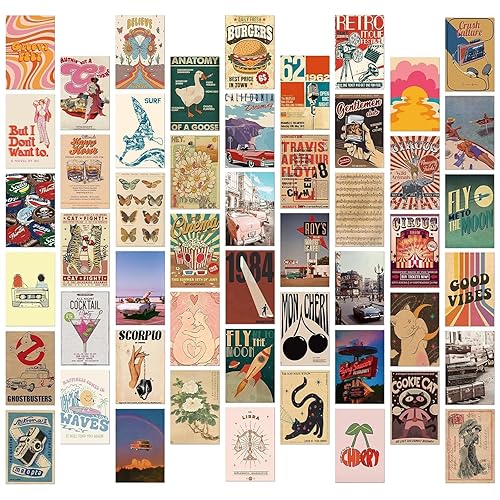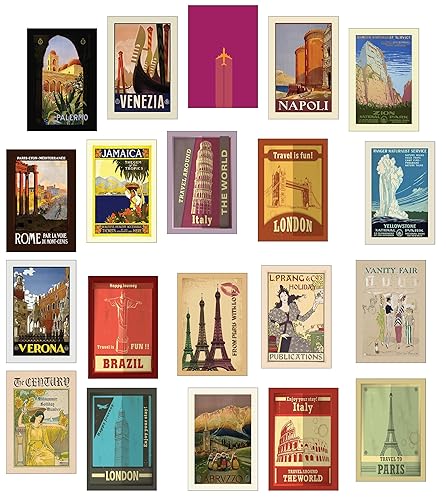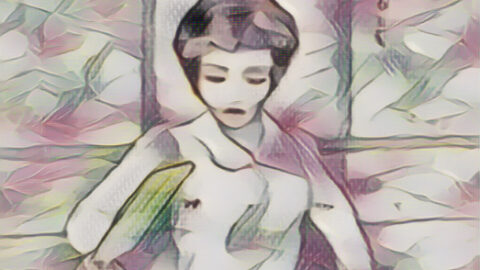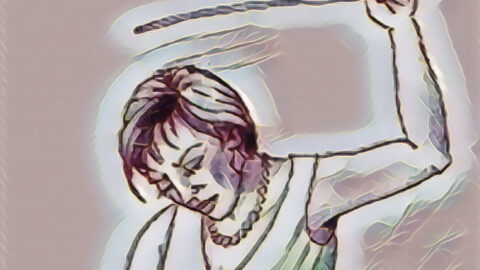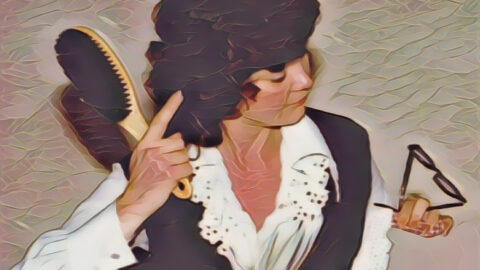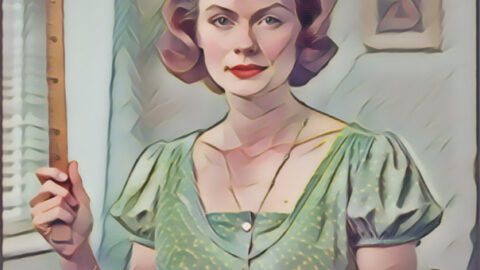(gap: 2s) My earliest memories are painted in the soft, golden light of a small English town in the 1960s—a world of quiet streets, red-brick houses, and the gentle chime of church bells on Sunday mornings. Our local church was the heart of the community, its stone walls echoing with hymns and the laughter of children. On those Sundays, my mother—always so composed, her hair neatly pinned, her skirt pressed and cardigan buttoned—would take my hand as we walked up the path, her sensible brown shoes clicking on the flagstones.
(short pause) My mother was a Sunday school teacher, and her faith was the guiding star of our family. She believed, with every fibre of her being, in the Christian ideal of selflessness. For her, serving others was not just a duty, but a calling. I remember watching her in the children’s activity room, her face gentle but focused, as she knelt beside a little girl struggling with a craft project, her hands steady and reassuring. The room was filled with the scent of crayons and glue, sunlight streaming through stained glass, painting rainbows on the floor.
(pause) I sat at a small wooden table, my own project spread before me—a paper dove, its wings stubbornly refusing to stick. I watched my mother, longing for her attention, but she was busy helping Tommy, a boy with a mop of unruly hair and a shy smile. “Mummy, will you help me?” I called, my voice small and hopeful. She glanced over, her eyes kind but firm. “I’m helping Tommy right now, dear. When I’m finished, I’ll come over and help you, alright?” I nodded, trying to be patient, but my heart ached for her presence.
(short pause) Minutes stretched into what felt like hours. The room buzzed with the chatter of other children, but I felt invisible, adrift in a sea of busy hands and cheerful voices. I fiddled with my paper dove, frustration building inside me like a storm. The clock on the wall ticked steadily, each second a reminder that I was still waiting.
(pause) At last, the session ended. My mother gathered her things, her voice gentle but distracted. “Alright, Peter, it’s time to leave.” Something inside me snapped. “Mummy, you said you’d help me!” I blurted, my voice sharp and wounded. The room fell silent. My mother’s face changed—her eyes narrowed, her lips pressed into a thin line. “Peter, you do NOT yell at your mother like that,” she scolded, her voice low and stern. “Now let’s go.”
(pause) Tears pricked my eyes. “I wanted you to help me, Mummy!” I sobbed, my voice trembling with hurt and anger. Without another word, she took my arm—her grip firm, unyielding—and led me out of the church hall. I felt the eyes of the other children on me, a hot flush of shame burning my cheeks. Outside, the air was cool and smelled of cut grass. My mother, silent and resolute, lifted me up and carried me under her arm, as if I were no heavier than a sack of flour, all the way to our old Morris Minor parked beneath the chestnut trees.
(pause) The drive home was silent, the only sound the hum of the engine and the occasional sniffle from me in the back seat. My mother’s hands gripped the steering wheel, her knuckles white. As we turned onto our street, she spoke at last, her voice clipped and final. “When we get home, young man, you go straight upstairs to your room, find a board, lay on your tummy on your bed and wait for me.” My heart pounded in my chest. “I’m sorry, Mummy,” I whimpered, but she cut me off. “Be quiet, Peter.”
(pause) Our house was cool and shadowy, the familiar smell of polish and baking bread lingering in the air. I trudged up the stairs, my legs heavy with dread. In my room, sunlight slanted through the curtains, dust motes dancing in the golden beams. I found the board—an old, flat piece of wood kept for just such occasions—and placed it on the bed. I lay down, burying my face in the pillow, my bottom propped up, waiting for the inevitable.
(pause) The wait was excruciating. My heart thudded in my chest, each beat echoing in my ears. The air felt thick, heavy with anticipation and fear. I could hear my mother’s footsteps on the stairs—measured, deliberate, each one drawing closer. The door creaked open, and she entered, her presence filling the room with a cold, stern energy. She knelt beside the bed, her face set in a mask of determination, lips pressed tight, eyes glinting with resolve. Without a word, she picked up the board, its surface smooth and cool against my skin as she laid it across my upturned bottom. (short pause)
(pause) The first smack landed with a sharp, explosive crack, the sound ricocheting off the walls. A jolt of pain shot through me—hot, stinging, immediate. My breath caught in my throat, and I squeezed my eyes shut, knuckles white as I gripped the pillow. Another smack followed, then another, each one searing, each one building on the last. The board was unyielding, its flat surface delivering a sting that seemed to burn through the thin fabric of my shorts, leaving my skin tingling and raw. The rhythm was relentless—smack, smack, smack—each blow punctuated by the sound of my own gasps and the muffled sobs that escaped me. (short pause)
(pause) The pain was overwhelming, a fiery ache that spread across my bottom, radiating outward in waves. My legs kicked involuntarily, my body tensing and twisting, but my mother’s hand held me firmly in place. The room seemed to shrink around me, the only reality the sting of the board, the sound of my mother’s voice—low, trembling with emotion—as she scolded me: “Don’t you ever, EVER, do that again, young man – do you understand?” Her words cut through the haze of pain, sharp and final. Tears streamed down my cheeks, hot and bitter, my whole body shaking with the force of my sobs. (short pause)
(pause) At last, it was over. My mother set the board aside, her hands now gentle as she helped me to my feet. My bottom throbbed, a deep, burning ache that lingered long after the last smack. I stood there, sniffling, cheeks wet with tears, my pride and body both wounded. She led me out of my room to the hallway, where the light seemed too bright, the air too cold against my stinging skin. There, at the end of the corridor, was ‘the corner’—my place of shame. I stood facing the wall, the wallpaper’s faded flowers swimming before my eyes, my bottom still pulsing with pain. My older sisters would pass by, snickering or making faces, their laughter echoing in my ears. I felt small, humiliated, and utterly alone.
(pause) That was the routine whenever I misbehaved—a ritual of discipline and disappointment, of longing for comfort and learning hard lessons. Yet, even in those moments, I knew my mother’s love was there, fierce and unwavering, shaping me in ways I would only understand much later in life.








